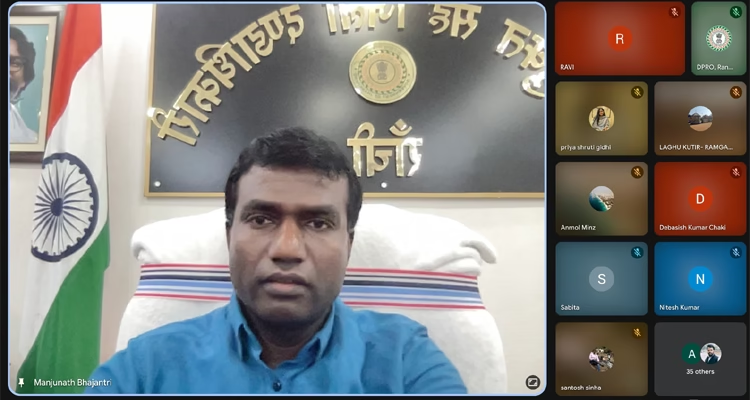
by Apurva
Ranchi: The Mukhyamantri Mainiya Samman Yojana, a flagship initiative of the Jharkhand state government, is rapidly emerging as a powerful instrument of economic empowerment and self-reliance for women in Ranchi district.
Spearheaded by the district administration, the scheme is not just offering financial aid—it is laying the foundation for sustainable livelihood development among rural women.
Under this transformative program, each beneficiary woman receives a monthly honorarium of Rs 2,500, which is being strategically utilized to promote poultry and goat farming—two key activities identified for their income-generating potential in rural areas.
The scheme is being implemented under the close guidance of Deputy Commissioner-cum-District Magistrate, Manjunath Bhajantri, who has been actively monitoring its execution at the block level.
As of April 2025, the district administration has successfully distributed 1,59,300 chicks among 3,051 women beneficiaries and 730 goats to 350 beneficiaries, under the self-employment component titled ‘Mainiya Samman Se Swavalamban’. These initiatives aim to strengthen rural women’s economic standing, enhance household incomes, and promote entrepreneurship in livestock-based activities.
In a comprehensive online review meeting held on May 15, 2025, Bhajantri conducted a detailed block-wise assessment of the scheme’s progress. He issued clear instructions to ensure continuous monitoring, timely distribution, and the inclusion of maximum eligible women in the scheme.
The review meeting brought together key stakeholders, including the District Public Relations Officer, Assistant Director of Social Security, District Animal Husbandry Officer, Lead Bank Manager, GM of DIC, DPM of JSLPS, Block Program Managers, and representatives from Niti Aayog.
During the session, Bhajantri also evaluated the progress of ‘Abua Groups’, grassroots collectives formed to enhance community participation and improve transparency in developmental activities. He directed officials to expand the scope of these groups by including a wider range of community members—notably youth, local public representatives, frontline health workers (Sahiyas and Sahayikas), PDS dealers, journalists, artists, and administrative staff. This inclusive approach aims to make development activities more participatory and community-driven.
The Deputy Commissioner emphasized that the Abua Groups must not only serve as a communication bridge between the administration and the people but also act as watchdogs ensuring timely grievance redressal. He reviewed complaints raised through these groups and instructed officials to ensure their prompt resolution.
A key highlight of the meeting was the introduction of the Potential Entrepreneurship Programme, launched by the Ranchi district administration to nurture an entrepreneurial ecosystem. This initiative seeks to identify and support 100 promising local talents, providing them with mentorship, skills training, funding opportunities, and a robust support network. The goal is to inspire innovation and turn local ideas into scalable, viable enterprises.
Bhajantri called for increased awareness about the program and encouraged local entrepreneurs to come forward and apply. He stressed that such initiatives not only create employment but also contribute to the district’s economic growth and resilience.
Finally, the Mukhyamantri Mainiya Samman Yojana—through its multi-pronged approach of direct financial support, livestock-based livelihoods, and community engagement—is reshaping the landscape of rural development and women’s empowerment in Ranchi. With continuous leadership, monitoring, and innovation from the district administration, the scheme stands as a beacon of hope and opportunity for thousands of rural women seeking dignity, independence, and a better future.



